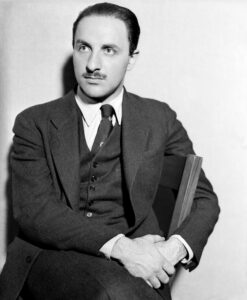
Opera Profile: Marc Blitzstein’s ‘Reuben, Reuben’
By John VandevertReuben, Reuben is a two-act “urban folk opera” or “musical play” written by American composer Marc Blitzstein (1905-1964) in 1955. He is most noted for his off-Broadway adaptation of Kurt Weill and Berthold Brecht’s The Threepenny Opera. Despite Blitzstein’s many works, his name is relatively unknown today nor his opera remembered.
The opera’s central story is based on the Faust legend as popularized by playwright Johann Wolfgang von Goethe and composers Charles Gounod and Georges Bizet. In describing the work Blitzstein called it a “picture of New York: the gaiety, plight, awareness and unawareness of anger, bitterness, insouciance, ardor, urgency, even wisdom, mellowness. All trapped: fighting the trap, or supine within it.”
Work on the opera formally began in 1953, although an earlier showing was scheduled for March of 1950. The work was a response to Gian Carlo Menotti and his opera The Consul. By 1954, work was beginning to go slow and Blitzstein had showed a desire to finish the project quickly. Editing did not stop until its premiere on October 10, 1955. However, only nine years and the opera would be relatively forgotten, having fallen out of performance and memory alike.
The work has many influences from both literature, philosophy, and music. American writers F. Scott Fitzgerald and William Faulkner to British figures like William Shakespeare and John Keats, even Homer and Aristotle are present in the story’s usage of symbolism. Musically,Blitzstein was inspired by Leonard Bernstein’s Symphony No. 2 and Giuseppe Verdi’s La traviata. Blitzstein had used the operas a musical and dramatic model for his own opera.
Despite the intense plot and music, the opera was not well received by Boston audiences during its premiere, and was considered unready by the press. However, Bernstein had called the work a “fallen angel” and had named his daughter after the main heroine, Nina.
Categories
Opera Wiki

